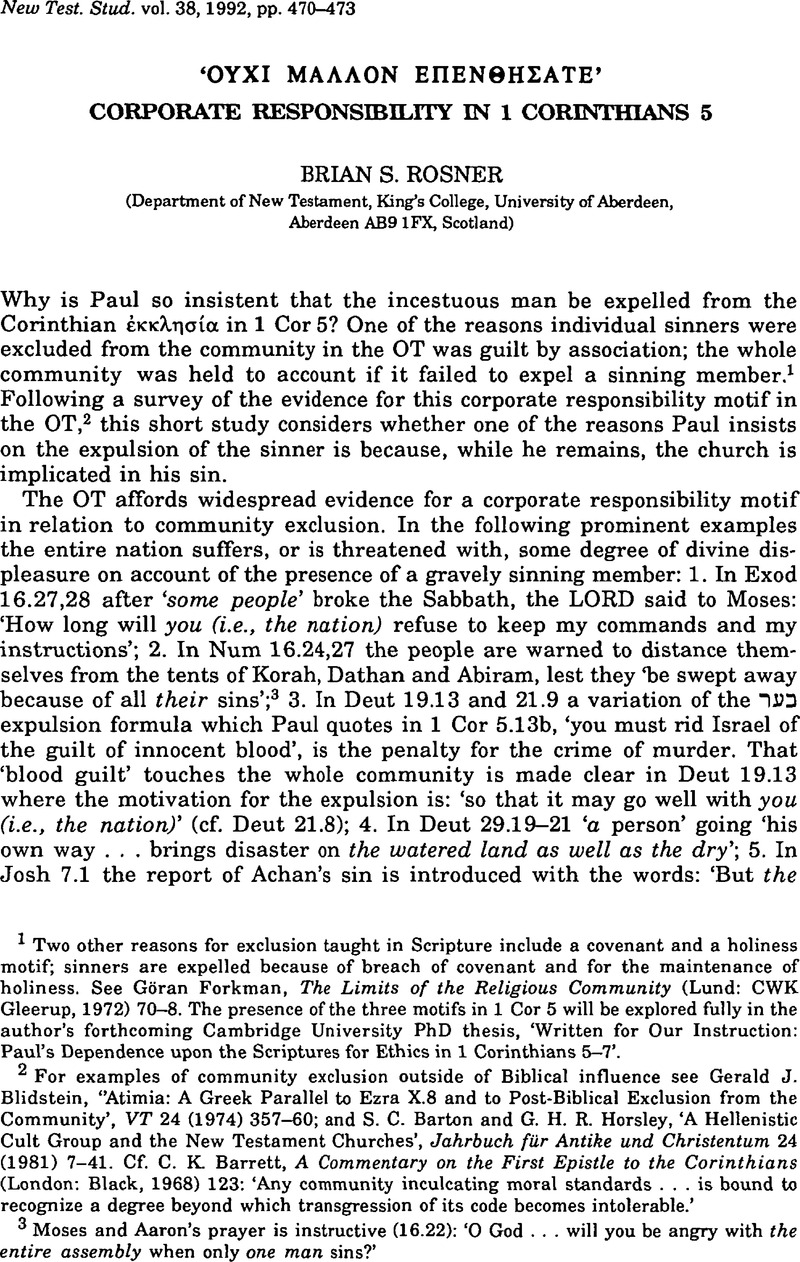Published online by Cambridge University Press: 05 February 2009

1 Two other reasons for exclusion taught in Scripture include a covenant and a holiness motif; sinners are expelled because of breach of covenant and for the maintenance of holiness. See Forkman, Göran, The Limits of the Religious Community (Lund: CWK Gleerup, 1972) 70–8Google Scholar. The presence of the three motifs in 1 Cor 5 will be explored fully in the author's forthcoming Cambridge University PhD thesis, ‘Written for Our Instruction: Paul's Dependence upon the Scriptures for Ethics in 1 Corinthians 5–7’.
2 For examples of community exclusion outside of Biblical influence see Blidstein, Gerald J., ‘'Atimia: A Greek Parallel to Ezra X.8 and to Post-Biblical Exclusion from the Community’, VT 24 (1974) 357–60Google Scholar; and Barton, S. C. and Horsley, G. H. R., ‘A Hellenistic Cult Group and the New Testament Churches’, Jahrbuch für Antike und Christentum 24 (1981) 7–41Google Scholar. Cf. Barrett, C. K., A Commentary on the First Epistle to the Corinthians (London: Black, 1968) 123Google Scholar: ‘Any community inculcating moral standards … is bound to recognize a degree beyond which transgression of its code becomes intolerable.’
3 Moses and Aaron's prayer is instructive (16.22): ‘O God … will you be angry with the entire assembly when only one man sins?’
4 The delegation go on to cite the example of Achan in 22.20: ‘When Achan son of Zerah acted unfaithfully regarding the devoted things, did not wrath come upon the whole community of Israel?’
5 Minear, Paul S., ‘Christ and the Congregation: 1 Corinthians 5–6’, Review and Expositor 80.3 (1983) 343CrossRefGoogle Scholar, observes that ‘in chapter 5, one verse deals with the incestuous person and twelve verses deal with the culpability of the congregation’. The presupposition of corporate responsibility, Christian solidarity, is introduced in 1 Cor in 3.23a, ύμεîς δἁ Xριστοῦ, developed by 3.16,17 and 10.17, and receives its classic statement in 12.12–31.
6 Schweizer, E., Church Order in the New Testament (London: SCM, 1961) 192Google Scholar, notes that in verses 3–5 Paul is ‘obviously striving to establish the church as the real bearer of responsibility’.
7 1 Corinthians (Philadelphia: Fortress, 1975) 99.Google Scholar
8 No commentator, to my knowledge, has investigated this possibility.
9 Whether their boasting was in spite of or because of the incestuous man is open to question. In either case, Lampe's, G. W. H. description of their attitude, ‘Church Discipline and the Interpretation of the Epistles to the Corinthians’, Christian History and Interpretation: Studies presented to John Knox (ed. Farmer, W. R., Moule, C. F. D. and Niebuhr, R. R.; Cambridge; Cambridge University, 1967) 343Google Scholar, is close to the mark: ‘truly enlightened believers are beyond the reach of any defilement from sinners’.
10 Pfitzer, Victor C., ‘Purified Community – Purified Sinner’, Australian Biblical Review 30 (1982) 34–55.Google Scholar
11 Cf. Moffatt's translation: ‘you ought much rather to be mourning the loss of a member’.
12 The circumstances prompting the mourning in 2 Corinthians 12.21 also involve πορνεία.
13 McComiskey, T., ‘πενθέω’, NIDNTT 2.422.Google Scholar
14 If the offender in 2 Cor 2.5 and 7.12 can be identified with the incestuous person of 1 Cor 5 (see Colin G. Kruse, ‘The Offender and the Offence in 2 Corinthians 2:5 and 7:12’, Evangelical Quarterly 88.2 (1988) 129–39, for a summary of the evidence), then it is noteworthy in 2.5 that the sinner caused pain (λυπέω) to all the Corinthans (πάντας ύμᾶς). The fact that in 2 Cor 7.9 λυπέω and μετάνοια are associated, supports the supposition that the pain the sinner caused the Corinthians may have involved their identification with his sin and need for godly sorrow.
15 It is also noteworthy that both taking wives from pagan peoples (Exod 34.16; Deut 7.1–3; cf. Josh 23.12,13), the sin with which Ezra dealt, and incest (Lev 18.8; Deut 22.30; 27.20), the problem in 1 Cor 5, are prohibited by the Torah. The critical sin in Neh was likewise illicit marriage (10.30; 13.27).
16 The First Epistle of Saint Paul to the Corinthians (London: Epworth, 1962) 35Google Scholar. Cf. also 2 Kings 22.11–20.
17 F. Blass, A. Debrunner and Robert W. Funk, Greek Grammar, § 473(1).
18 In each case the Majority Text (and a few early witnesses) alleviates the asyndeton by supplying οΰν, καί, and καίrespectively.
19 Paul S. Minear, ‘Christ and the Congregation’, 341. Cf. Collins, Adela Y., ‘The Function of Excommunication in Paul’, HTR 73 (1980) 263CrossRefGoogle Scholar, who when discussing Paul's reasons for excommunication identifies the holiness of the community but adds, ‘there may well have been other, unspoken reasons.’
20 I would like to acknowledge the helpful advice and insight of Dr William Horbury in the writing of this paper.